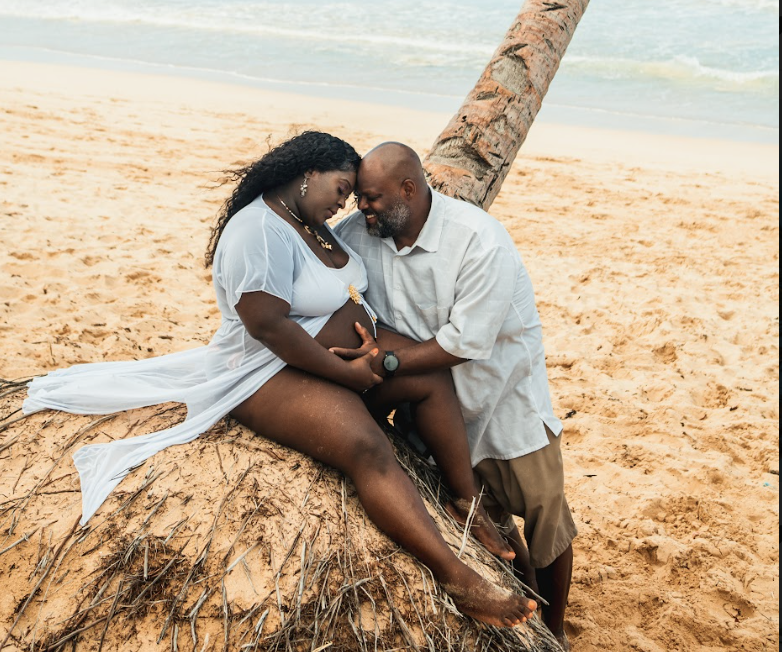Mother shares fears of ‘being pregnant while Black’ and what you can do to ensure proper treatment


For many women, pregnancy is a time of joy and celebration, but for others, it can be a death sentence, or almost feel like one. Just like African Americans have fears of “driving while Black” and “shopping while Black,” there is also a stigma attached to being “pregnant while Black.”
Like most women, I had a range of emotions when I found out I was pregnant. Although it wasn’t my first pregnancy, I still had the same doubts and jitters as a first-time mom. Living in a digital society, you can find yourself wondering what’s fact vs. fiction.
A huge concern for me was how do I keep myself safe during the COVID-19 endemic? I had cousins and acquaintances who experienced childbirth during the pandemic and it was not an easy process. I also developed major complications during my first pregnancy and had to have an emergency C-section and was terrified that I was at risk for developing pre-eclampsia and toxemia again.
With all of those fears scrambling around in my head, it didn’t put me in the spirit to celebrate. I have to be honest with you, I love to put on a fabulous show and turn up. If “putting on for the Culture” was a person, it would definitely be me. So needless to say, I was not thrilled about a COVID-inspired zoom baby shower or a Facebook Live gender reveal. Don’t get me wrong, I have had my share of virtual baby gatherings and most of them were really fun, but it’s just not my thing.
[SCROLL BREAK!!! Bayou Beat News can also be found in PRINT at a store near you. Click the link below to check out our E-Edition!]
I also wondered how the lack of socialization would affect me. I remembered my first pregnancy with my now 5-year-old son and the best part for me was getting dressed up and going out to eat with my family and friends. I would beg my friends to drive me to the Red Wagon Snow Cone shack on Almeda in Houston, Texas, and persuade my cousin to ditch her diet and indulge with me in late-night runs to the Cheesecake Factory at the Galleria. And don’t get me started on the endless fish fries I made my dad host. Let’s just say, I enjoyed my summer pregnancy. I gained 60 pounds in the process, but I loved every minute.
Fast forward five years later and I find myself locked in my house googling ‘what is pregnancy sadness?’ Was I sad because I was pregnant? Why was I not bonding with my baby, why was I not having the same joy as I had before?
Without the persistent “may I touch your belly” requests from friends and strangers. I found myself feeling detached and estranged from society, but was it due to COVID isolation or something else?
Society speaks about postpartum depression but I had never heard of perinatal depression. So much importance is put on connecting with your child in utero so to have a disconnect makes you feel inadequate. I was also told by my doctor that I was experiencing hypertension and gestational diabetes. I followed the doctor’s rigorous demands and still ended up having to undergo a C-section at 77 weeks.
I remember a conversation I had with a close friend before I gave birth who had a similar birthing story. We talked about Beyonce and Serena Williams and how giving birth for Black women could be a death sentence. We questioned why didn’t we hear of this back in the good old days. There were always stories of our grandmothers and great-grandmothers having 10 and 13 children so why are so many Black women suffering from these issues now? Are we a “weaker” generation who do not know how to deal with our emotions?
Another huge difference we spoke about is how we rely mostly on OBGYNs and hospitals for our deliveries with lots of controversial medications today versus our ancestors utilizing midwives and alternative plants, roots and medicines that nurtured our minds and body.
An alarming number of Black women have reported feeling ignored by health care professionals and being provided less care compared to women of other races and ethnicities in America. A study by the Centers for Disease Control states that the maternal death rate for Black or African-American (not Hispanic or Latina) women was 44.0 per 100,000 live births in 2019, then increased to 55.3 in 2020, and 68.9 in 2021.
Now, there has been an increase in modern-day Black women turning to doulas and holistic medication. Doulas are trained, non-clinical professionals who can give a mother emotional, physical and educational support. According to a 2020 study by Blue Cross And Blue Shield, there’s strong evidence that working with a doula can reduce childbirth complications and improve care coordination.
Don’t be afraid to seek help!
If you are a woman of color, advocate for yourself or bring a strong loved one with you who can advocate for your care and treatment. Knowledge is power and learning the best resources for you and the life that you are growing is the utmost importance.
If you are in the Houston area, the Lactation Foundation has a list of resources, for physical and mental health, that you can utilize – oftentimes for free. Click here for more information.
Nationwide, the Centers for Disease Control and Prevention also shares a wealth of resources for mothers. Click here to learn more.
I hope that by sharing my story it helps other women who may have had the same experience or currently going through it right now.
